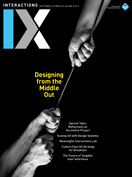Authors:
Shaimaa Lazem
I recently worked with an indigenous Egyptian community that took great pride in their heritage. Afterward, I could not help wondering if my cultural identity has become too hybrid because of my Western education. I found myself trying to establish links with my heritage by using Egyptian proverbs in my lectures, and even in my writing. My reading choices reflect my attempt to understand issues at the intersection of culture, heritage, and technology.
The book Reproduction of Folk Heritage: How the Poor Cling to Life in the Context of Scarcity by Saeed El Masry (2013) was awarded the Arab Heritage Prize by the Arab League Educational, Cultural, and Scientific Organization in 2014 [1]. The author attempts to understand the reproduction of folk heritage, a process that he defines as the ability of a society's lifestyle to sustain its prominent features through change. The core idea is that the transmission of folk cultural elements vertically through generations or horizontally through human communication does not lead to a complete reproduction of all their features, nor does it fully replace them with new elements. The author studied the lives of the poor in Cairo, whose folk heritage is their real capital, their secret for survival in the absence of resources. The book shows the richness in their lives despite the scarcity, demonstrating four processes by which they reproduced their heritage: repeating folk practices to regulate their daily activities, recalling and appropriating lessons learned from folk stories to handle new events and situations, borrowing practices from other classes and cultures, and creating novel cultural elements.

My second and third reading choices are from projects that address technology design with indigenous communities, who are keen on preserving their unique and traditional folk knowledge.
My reading choices reflect my attempt to understand issues at the intersection of culture, heritage, and technology.
In "Being Participated—a Community Approach" by Winschiers-Theophilus et al. [2], the authors describe working with a Sub-Saharan community to design an ICT system for their indigenous knowledge. They illustrate that contemporary systems of knowledge are produced within certain sociocultural discourses embedded with Western values that are different from indigenous ways of knowing. It is therefore unfair for Western designers to devalue indigenous knowledge as deficiencies. Drawing on the African philosophy of humanness—Ubuntu—expressed in the aphorism "a person is a person through other people," the authors explain that participation is a core value and a well-established practice in rural African communities. Hence, they invite designers to expect a shift in leadership and to be open to "being participated." They emphasize the importance of mutual learning as a prerequisite for truthful participatory interactions.

In "A Respectful Design Framework: Incorporating Indigenous Knowledge in the Design Process," Reitsma et al. [3] introduce the respectful design framework to ensure that the design process is led by the community and that indigenous knowledge has a central place in it. They worked with the Long Lamai community in Sarawak, Malaysia. The design project started with probes that were designed by the external designer, and then were shaped and changed through co-creative encounters with the community. The authors showed that the community went through multiple stages of third-space negotiations, as they needed time to recognize the resources they bring to the table, with encouragement from the external designer. The community then took charge of the design space and was able to embed design decisions in their indigenous knowledge, thus reaching a respectful design space.
1. El Masry, S. Reproduction of Folk Heritage: How Poor Cling to Life in the Context of Scarcity. Cairo Supreme Council of Culture, 2013.
2. Winschiers-Theophilus, H., Chivuno-Kuria, S., Koch Kapuire, G., Bidwell, N.J., and Blake, E. Being participated—A community approach. Proc. of the 11th Biennial Participatory Design Conference. 2010.
3. Reitsma, L., Light, A., Zaman, T., and Rodgers, P. A respectful design framework: Incorporating indigenous knowledge in the design process. Proc. of the 13th International Conference of the European Academy of Design 2019. European Academy of Design, 2019.
Shaimaa Lazem is an Egyptian academic. Her research interests include HCI education, participatory design, and decolonizing HCI. She was awarded the Leaders in Innovation Fellowship with the Royal Academy of Engineering in London to support digital self-documentation of intangible cultural heritage. She is the co-founder of ArabHCI.org. [email protected]
Copyright held by author
The Digital Library is published by the Association for Computing Machinery. Copyright © 2019 ACM, Inc.








Post Comment
No Comments Found